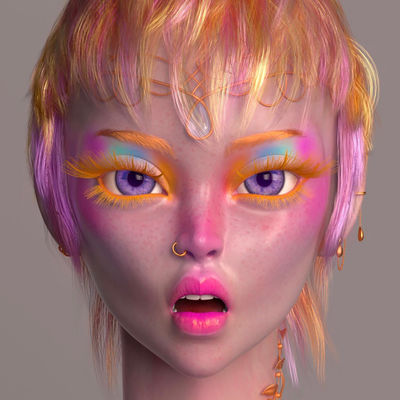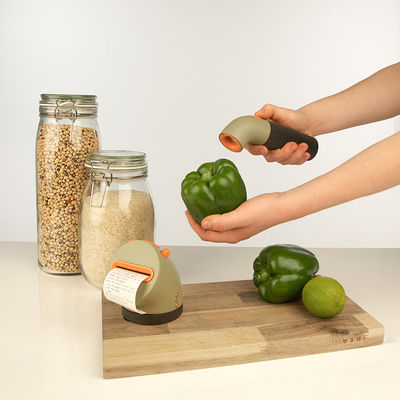29 : 07 : 22 : Weekly Debrief
This week: Haeckels rebrands, nurturing digital make-up artists, gamifying the hotel experience, eliminating food waste, and a meat-free brand inviting customers to ‘grow’ sausages.
1. Haeckels rebrands with four pillars of bio-beauty
London – Progressive beauty company Haeckels has unveiled a rebranding and new company strategy focused on four product and experience pillars: skincare, home and personal fragrance, and Haeckels Lab – a new series of clinically backed skincare designed around the microbiome. In particular, the company is championing Bio-positive Beauty with circular, biodegradable packaging innovations, alongside efforts to combat waste and transform end-of-life cycles for products.
Haeckels Home will provide seasonally changing and refillable home fragrance and candles designed around hyper-local supply chains, while Haeckels Skin will centre on compostable ocean-first skincare. Launching in August, Haeckels Fragrance will unite location-specific scents with personal experiences, while its Lab, launching in September, hints at a more bespoke skincare offer.
‘It isn't in our DNA to stand still,’ says Charlie Vickery, managing director. ‘With the new Haeckels, we again rip up the rulebook to present the new natural. Created by a local team of designers, scientists, creatives and industry outsiders, this new Haeckels brings pioneering science-backed technology and materials to a newly awakened consumer without sacrificing aesthetics.’
Here, Vickery highlights key themes from our latest Beauty & Wellness macrotrend Accredited Beauty, in which we forecast a future of beauty underscored by science, bio-technology and product certification.
 GORJS by NYX Professional Makeup in collaboration with @thisiscraves, @smeccea and @curry_tian, US
GORJS by NYX Professional Makeup in collaboration with @thisiscraves, @smeccea and @curry_tian, US
2. NYX’s DAO collective nurtures digital make-up artists
LA – As the beauty industry finds its footing in the metaverse, the make-up brand is launching a Decentralised Autonomous Organisation (DAO) aimed at 3D artists. Dubbed GORJS, the DAO will serve as a launchpad for artists to expand the use of digital make-up and beauty within virtual realms.
In its launch phase, GORJS will work with three creators: Craves, Shams Meccea, and Curry Tian. All three have been chosen in line with the brand’s values of diversity, inclusivity and accessibility in Web3. As the community-led collective develops, it will later become available for other aspiring users to join. By doing this, the brand is paving the way for an equitable playing field in the world of digital beauty. Yann Joffredo, global brand president at NYX Professional Makeup says: ‘This community will help define what beauty, creativity, and identity mean in this new world.’
With 3D make-up artistry growing in line with people investing in the digital versions of themselves, we’ve been tracking the innovations that are shaping the sector’s metaverse future.
3. The Marriot gamifies the hotel experience
Asia – The Moxy Hotel, an offshoot of The Marriott group, is gamifying the hospitality experience in an effort to draw in younger consumers and make hotel stays more enjoyable. Available at 12 of its hotels in the Asia Pacific region, Moxy Hotel is introducing an augmented reality (AR) experience called Moxy Universe, Play Beyond! – which transforms the hotel into a phygital playground. The AR initiative will be available until the end of this year.
To access the experience, guests scan a QR code with their smartphones, unlocking a number of interactive challenges across the hotel. Before checking in, visitors can also personalise a digital avatar with a variety of hairstyles, outfits, and accessories. The avatars are then activated via a smartphone camera, letting users take photographs that combine computer-generated overlays with the backdrop of the hotel. This campaign is likely to land well with the consumers in this region, with countries such as China and Japan leading the way in the sector’s global popularity.
As the hospitality industry bounces back from the pandemic, The Moxy Hotel is aiming to create more memorable stays that can be readily captured and shared on social media. By levelling up its services to create a gamified guest experience, the hotel is tapping into the rise of E-tourism.
4. This aroma detector aims to eliminate food waste
In its current prototype phase, the device can only detect organic compounds released by bananas, apples, potatoes and a range of other fruit and vegetables as they decay. Future iterations of Snoot could work with a variety of other foods. Here, this project empowers everyday consumers to make better decisions about the foods they deem ripe for consumption.
‘There is a big gap in knowledge around freezing and defrosting food safely, how long it should be frozen for and what food is suitable,’ says Almond. ‘Snoot aims to aid this gap in understanding by providing exact instructions on how to freeze food safely.’ Such a solution also aligns with the growing number of innovations emerging to curb food waste.
 Snoot by Harriet Almond, UK
Snoot by Harriet Almond, UK
5. Peas of Heaven invites its customers to ‘grow’ sausages
Sweden – The plant-based meat brand is running a novel campaign to encourage more people to enjoy its faux meats. Tuning into the growing adoption of home-grown produce, the brand is encouraging its customers to exchange their peas for sausages.
The campaign, by creative agency Forsman & Bodenfors, presents a grow-your-own-sausage kit consisting of pea seeds, instructions and a bag for consumers to send back their peas in. Highlighting the versatility of plant-based foods, the brand allows customers to choose between chorizo, barbecue sausage or cabanossy varieties of sausage.
Julia Holtback Yeter, art director at Forsman & Bodenfors, said: ‘With this idea, we take a hands-on approach to plant-based comfort food.’ The brand also notes that – while it’s not the quickest way to access sausages – the campaign hopes to shed light on the process behind creating plant-based foods. In a similar vein, we’ve previously explored how ingredient brand Merchant Gourmet is promoting vegan diets through its cookbook with a plantable cover.
To future-proof your world, visit The Future Laboratory's forecasting platform LS:N Global for daily news, opinions, trends, sector specific insights, and strategic toolkits.
Want to read more?
Become a member today!
Sign up to one of our trends intelligence platform, LS:N Global and get unlimited access to a hive of insights - from microtrends and macro trends to market reports, daily news, research across eight industry sectors and much more.
Discover our memberships
Already a member? Click here to login
